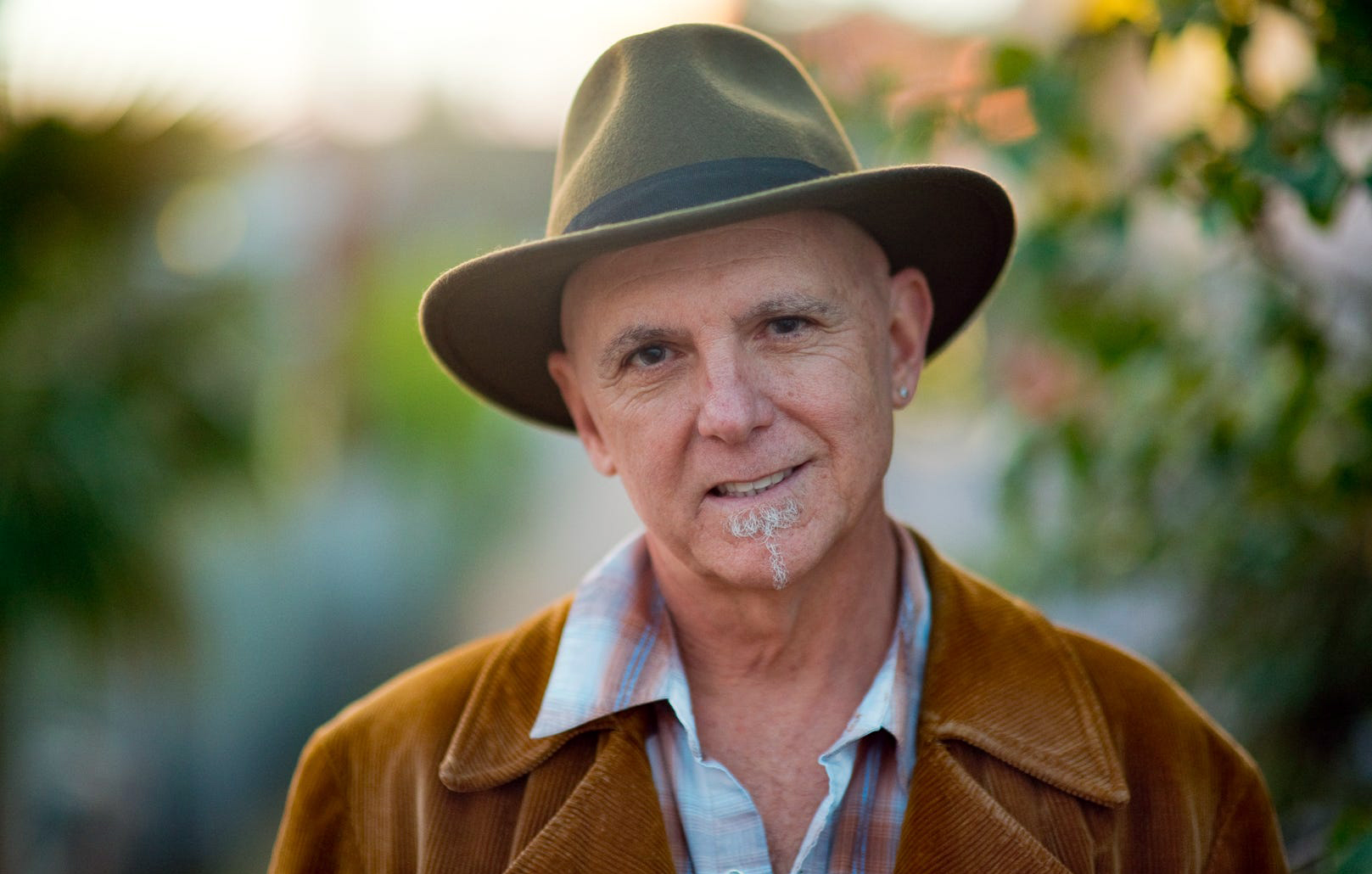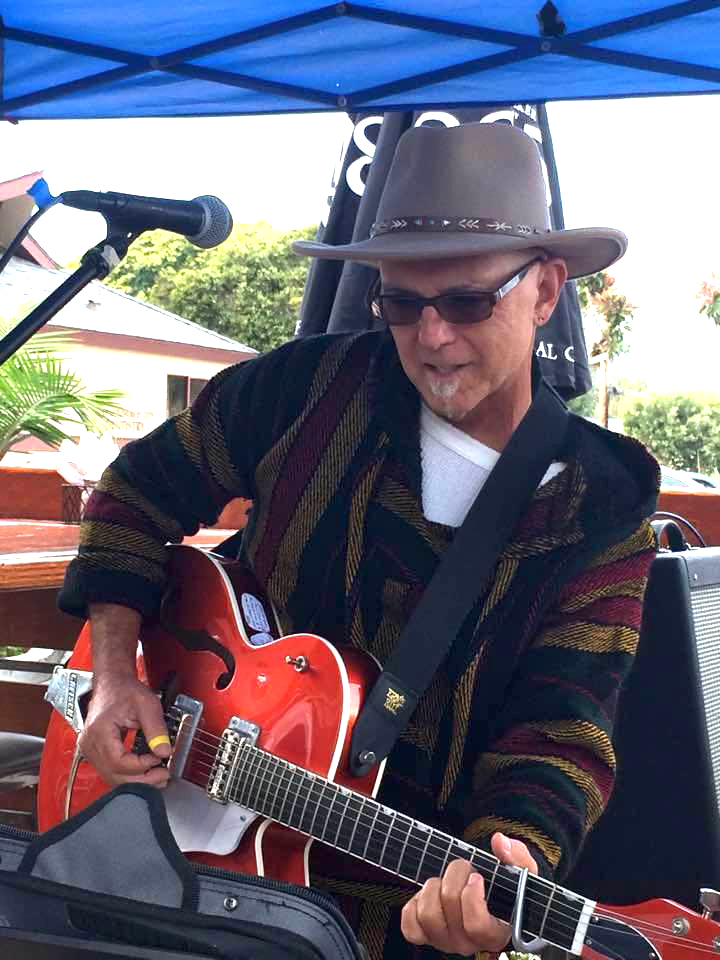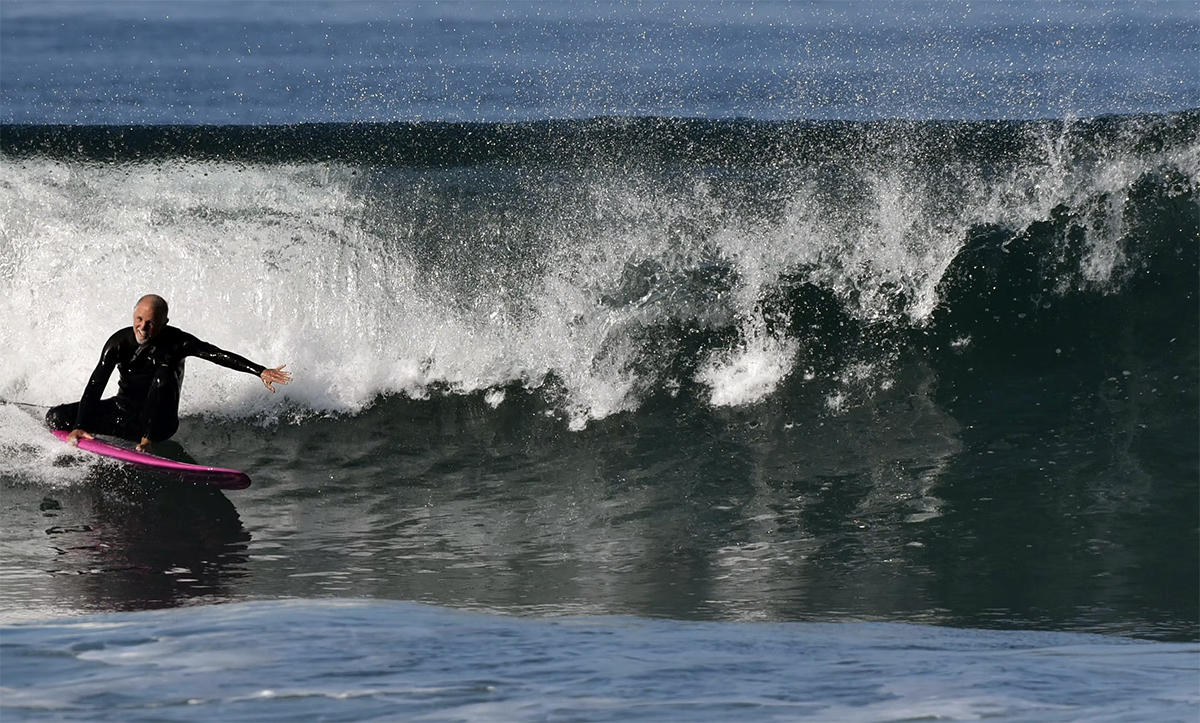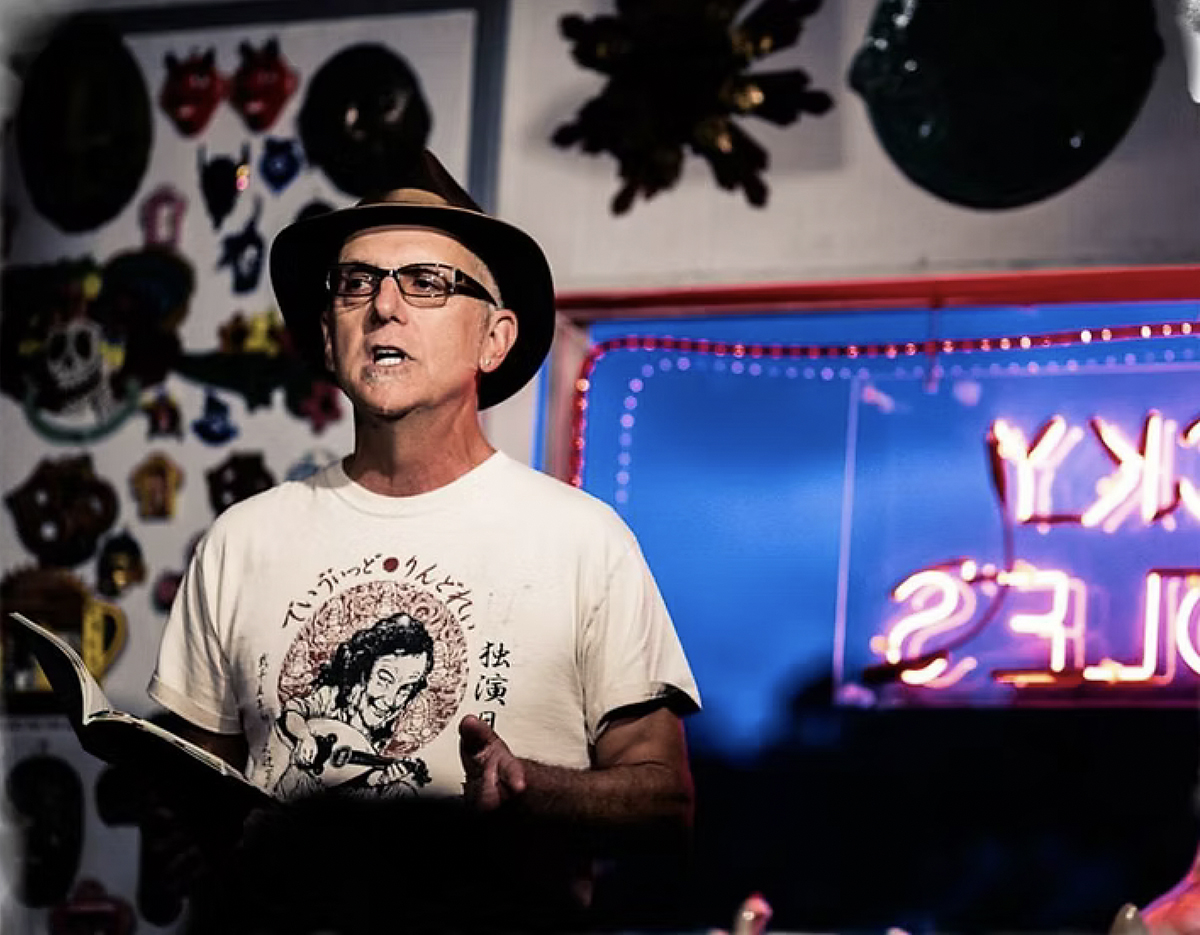Featured Stories
All About Darius Degher: The Man Gets Better and Better

Darius Degher
When Darius Degher texted me that he has a new album coming out, I cringed.
I’ve really gotten into this true-crime podcast, and I knew that as soon as the record hit, I would have to put my podcast-listening on hold and listen to his new LP—not just once, not just twice, but over and over again for days. Hell, maybe even weeks.
The record came out August 8. Three days later, I’m still listening to it. Hell, even when I’m not listening to it, I’m hearing it in my head.
Yeah. His stuff is that good.
The same thing happened the last time he put out a record, and now it’s happening again.
Rhyme in the Wreckage is Degher’s 13th record, and of the 10 new songs the veteran North County singer-songwriter chose to include, it’s hard to pick a favorite. Listening to one song after another is like leafing through a poetry book set to music. The lyrics are deep and introspective; the music is rooted in folk but basted in melodic pop; the production is clean and sharp and, well, modern. I could see this record appealing as much to fans of Bob Dylan or Paul Simon as Gen Zers enamored with Noah Kahan or Gregory Alan Isakov.
The first single from the album, “Ode to California,” reflects Degher’s love of the early 1970s singer-songwriter craze, with a seductive lead vocal and sparse but effective instrumentation—along with sweet harmonies by Cathryn Beeks, another talented local. The song is, well, an ode to California, the state in which Degher was born and raised—and which, he sings, has a “magic, tragic history” and remains the home of “immigrants and seekers.”
The other songs are just as infectious, both lyrically and melodically. I loathe cliches, but Degher truly is a master tunesmith, and what strikes me as so significant is that while so many other songwriters lose their touch with time, he’s still turning out great songs that drop in on your ear and then refuse to leave. “The Premonition” is a clever song about a couple living through a big earthquake, based on Degher’s own experience while living in L.A. during the notorious Northridge quake of January 1994. “Card with Hearts,” sung with daughter Cleopatra (named after his mother), appropriately enough, explores the ties that bind families together. And “Travel in my Garden” is a humorous look at the staycation.
Degher himself says of the album, “So, I had 10 new songs. One about riding bicycles, another about the greatest lies of human history, one about California, and seven others. I was just gonna make an album of simple acoustic guitar recordings like my last one. But once the overdubbing began, some of the arrangements got a little more complicated. A Maid-Rite “family-size” washboard provides most of the percussion, even the ‘snare’ sounds. I played the guitar and bass parts myself using various Gibson, Fender, Martin, Taylor, and Gretsch instruments.” Guests on the album, in addition to Beeks and daughter Cleopatra, include Cindy Lee Berryhill, other daughter Cordelia, Don Teschner (formerly with Rod Stewart’s touring band) and Carl Byron (Jackson Browne, Rita Coolidge, Michelle Shocked).”
*************
I’ve known Darius Degher since the early ’80s, when I was writing about the San Diego music scene for the Los Angeles Times after a nearly two-year run publishing my own local music magazine, Kicks. At the time, the Spirit and the Bacchanal were San Diego’s two top clubs for live music. The Bacchanal was home to all sorts of national touring acts—sort of the House of Blues or Belly Up Tavern of its day. But the Spirit—man, that was where all the cool San Diego bands would play, drowning out the barking dogs at the adjacent Kelly Pet Hotel with all sorts of mystical, magical punk, roots rock, power pop, and other compelling styles.
At the time Darius was fronting what I called, in a Los Angeles Times story, “psychedelic revivalists” Darius and the Magnets, a band he had put together in San Diego after a brief foray into punk with the Attachments.
Born and raised in Riverside, Degher, now 67, grew up in a somewhat musical household: His older brother, Denis, was a singer-songwriter, and his father was a singer who dabbled on guitar. By the time he was 12 he, too, was writing songs and playing guitar, and within two years he had formed the first of several local bands.
In the middle 1970s, Degher and his family moved to Encinitas, where he attended San Dieguito High School (and won a Bank of America Award for foreign language). He continued to write songs and play music and, while in his early 20s, joined the Attachments. The band regularly played such legendary punk haunts as the Skeleton Club, the Spirit, and the Zebra Club, where one of the regulars was Cameron Crowe, who was in town to research what would later become Fast Times at Ridgemont High. He soon switched to the Magnets, for whom he doubled on guitar and sitar, an instrument he had learned while studying ethnomusicology at UCLA.

In 1983 Degher struck out on his own and moved to Los Angeles with the Magnets, but broke up the band a year later and into the city’s then-thriving acoustic music scene, playing clubs and coffeehouses. He also did session work, playing sitar on the Sentimental Hygiene album by the late Warren Zevon. BAM magazine called him “a master travelogue storyteller in the traditional of Woody Guthrie.” His first album, Cardboard Confessional, came out in 1990 on the Gold Castle Records label, with guest appearances by Danny Gayol of the BoDeans, Chet McKracken of the Doobie Brothers, and Jerry Giddens of Walking Wounded. His key influences, he says, include Jimmy Webb, Bobbie Gentry, A.C. Jobim, Leonard Cohen, Joni Mitchell, Merle Haggard, Stevie Wonder, Kate Bush, Randy Newman, and Bob Dylan.
In 1990 Degher toured nationally, opening for such acts as Don McLean, Guy Clark, and David Bromberg, and he’s continued to refine his art, and put out records and play club dates, ever since—with sporadic, multi-year breaks to raise a family and support them.
“You know, life gets in the way,” he says. “There have been children and now a little grandchild. There was a day job as a university writing teacher for 20 years. Prior to that, I returned to UCLA and got an English degree—I had dropped out of the music major years before. There was also a move to Sweden…. So there’s been plenty of tumult and beauty: new country, new language, new studies, etc. I also got a master’s degree in England, which is when I became an actual poet alongside being a poetic songwriter. Generally, when I wasn’t making music, I was making poetry.”
Over the last 10 years, though, Degher has been quite active, musically, with most of his 13 LPs having been released since 2015.
“I’ve just had more time,” he says. “It may also be that I’ve been doing this so long now that I no longer have dead periods or writer’s block. I know how to put myself in the frame of mind for receiving the muses pretty much whenever I want to these days. So now, when there are fewer distractions, I dive in and make things. Yes, it’s been a fruitful 10 or 15 years, and I’m grateful for that.
His new album, he insists, is his best yet, but he cautions, “I say that with each new release.”

Degher, riding the waves.
He continues: “It’s hard—and weird—to evaluate your own work. But I will say that I feel like I’m in peak artistic form. After digging deeper and deeper through the years as a writer of both poetry and music, and after running hundreds of creative writing workshops, I’m at a place now where I can see the pitfalls approaching and try to avoid them—not that I always succeed. This album feels to me like the most complete and mature one I’ve ever made. The lyrics incorporate my usual philosophy and social commentary, but they may be more subtle than some from my past. The chord changes and melodies are also a bit more expansive, which I suspect is the influence of my instrumental Westwatcher albums. Without lyrics to distract me there, I learned to focus on the harmony and melody in a different way. At that time, I was listening to lots of Jobim, Jimmy Webb, and Burt Bacharach, so that’s informed things, for sure, perhaps taking the songs in a slightly more complex direction. As for the performances, I don’t have one of those magical singing voices. I know that. But neither do most of my favorite singer-songwriters. I hope it’s sonically sound at the production level. I did the best I could with the ears I have.”
How does Degher describe—or define—his sound? And has it changed over the last 40 years since his move to L.A.?
“Jay Allen Sanford once said I was ‘a postmodern eclectic before it was cool,’” he says. “But I didn’t always see that as a positive thing, sometimes wishing I had more of a mono-focus at the level of style. But these days, the younger artists are equally eclectic, rambling far and wide. So, I no longer seem anomalous. That said, for over 40 years now, I’ve been a songwriter-singer-folksinger above everything else, albeit sometimes a weird and adventurous one. That’s the core Darius, and that’s what I’ve circled back to with these last two albums. My many other musical projects are more like offshoots, and I’ve always returned to the songwriter-singer me. Of course, there’s interplay among all of these projects and styles.

Degher at a poetry reading.
But the one way my artistic life has had periods is that I’ll usually be in a poetry phase or a music phase, but not usually both at the same time. I see the two as pretty distinct art forms with distinct traditions. When I’m writing poems, I tend not to be writing songs and vice versa. Right now, after this release, I’m hoping to get more poems written for a second collection.”
What does the future hold for Darius Degher? He’s officially a senior citizen, has two grown children and a baby granddaughter, and still lives near the beach in San Diego’s glorious North County. He teaches writing at the Arts Center in Encinitas and still delights in making music, often with his daughters, both of whom are talented musicians in their own right.
“We may be prettier when we’re young, but that’s about it,” he says with a laugh. “If you have a lifelong dedication to the art, it gets better with each passing year. I feel like I’ve hit my stride now. When I get to be 90 or 100, I might be pretty good.”






